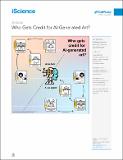Who Gets Credit for AI-Generated Art?
Author(s)
Epstein, Ziv; Levine, Sydney; Rand, David Gertler; Rahwan, Iyad
DownloadPublished version (2.044Mb)
Publisher with Creative Commons License
Publisher with Creative Commons License
Creative Commons Attribution
Terms of use
Metadata
Show full item recordAbstract
The recent sale of an artificial intelligence (AI)-generated portrait for $432,000 at Christie's art auction has raised questions about how credit and responsibility should be allocated to individuals involved and how the anthropomorphic perception of the AI system contributed to the artwork's success. Here, we identify natural heterogeneity in the extent to which different people perceive AI as anthropomorphic. We find that differences in the perception of AI anthropomorphicity are associated with different allocations of responsibility to the AI system and credit to different stakeholders involved in art production. We then show that perceptions of AI anthropomorphicity can be manipulated by changing the language used to talk about AI—as a tool versus agent—with consequences for artists and AI practitioners. Our findings shed light on what is at stake when we anthropomorphize AI systems and offer an empirical lens to reason about how to allocate credit and responsibility to human stakeholders.
Date issued
2020-09Department
Massachusetts Institute of Technology. Media Laboratory; Sloan School of Management; Massachusetts Institute of Technology. Department of Brain and Cognitive SciencesJournal
iScience
Publisher
Elsevier BV
Citation
Epstein, Ziv et al. "Who Gets Credit for AI-Generated Art?" iScience 23, 9 (September 2020): 101515 © 2020 The Author(s)
Version: Final published version
ISSN
2589-0042